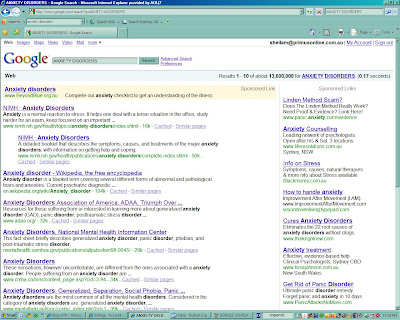Module 4 Tasks - Web Search Tools
1. Choose your most commonly used internet search engine and do a search with words of your choosing. Record the first hit and number of hits in your learning log.




Well, this was quite easy. My most commonly used internet search engine is Google (well, the only one - is there anything else?), so I chose the words 'anxiety disorders' and found that there were 13,700,000 hits, the first one was BeyondBlue.org.au.
2. Using copernicus or similar, set it up to search at least three search engines (including one that will search the 'deep web') and repeat exactly the same search. Record the number of hits in your learning log, and compare to your first search. What differences did you notice? Why? Which search, on first glance gave you the most promising results?

I had downloaded 'copernic" a few weeks ago in preparation for doing these tasks, but to be honest had no idea how to set it up to search three engines, or how to do a 'deep web' search, and as I was running out of time, I just did a 'search web' in copernic. This resulted in only 37 hits. I did notice that most of the top five had the words "found on Google" next to them, but interestingly, the sites were not in Googles top 5? The top hit in this search was http://www.panic-anxiety.com/. I then noticed that the next two entries were for the same organisation. The sites all seemed to be US ones, whereas in the Google search, the 'top hit' was an Australian site.
I did notice that Copernic had "advanced search preferences", and when I did the same search in this mode (I used the same words), there were even more results (50, rather than 37), and interestingly the first page of hits were all results found on Yahoo (rather than Google as in the standard search). The top hit in this mode was the wikipedia entry.
Anyway, as I hadn't been able to set Copernic up to search 3 engines, I decided to do some more searches, so I used Clusty (http://www.clusty.com/) - this resulted in 2,269,000 results. The top hit was adaa.org which is an American society for anxiety disorders, then another government site (nimh.gov) followed by a wikipedia entry.


I then decided to do another Google search, this time using Google Scholar. This resulted in 1,360,000 and the results were more 'academic', they seemed to be papers and research on anxiety disorders, rather than organisations.

Then I decided to do a Windows Live search. To be honest I hadn't heard of Windows Live before, but noticed it had come up in the Copernic search. Surprisingly, this had the most hits (I would have thought it would be Google), with an amazing 19,300,000. The top hit for this site was the Mayo clinic.
As to which site gave the most promising results? Well I would have to say Google. Mainly because the top hit was for BeyondBlue, which is an organisation I have heard about, and is Australian. However, in saying that, I would be tempted to use Copernic, because there were far fewer entries. I don't know that I would use Windows Live instead of Google, because although there were more hits, who on earth has time to look at over 19 million entries? ie what difference does it make if a search engine comes up with 13 million or 19 million entries?
I will still continue to use Google (and Google Scholar now that I know about it!). One thing I usually do (and didn't do this time) is go to Google Australia and search pages from Australia, to narrow the hits down to more relevant ones.
I was going to move on to the Boolean search task now, but as its almost midnight I'm going to leave that for tomorrow!










0 Response to "Module 4 Tasks - Web Search Tools"
Post a Comment